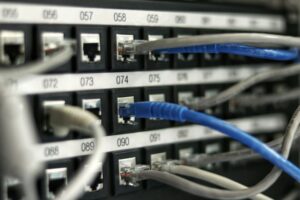Smart home technology has seen significant growth in recent years, revolutionizing the way we live and interact with our homes. From voice-activated assistants to smart security systems, these devices offer convenience, energy savings, and improved safety. However, with the increasing popularity of home automation, it is important to understand both the benefits and potential risks associated with these devices.
Key Takeaways
- Smart home devices are growing in popularity, with an estimated 1.39 billion devices expected to be in use by 2024.
- Voice-activated assistants like Alexa, Google Home, and Siri offer convenient control over smart home devices and can even help with daily tasks.
- Smart security systems can automate tasks like locking doors and turning on lights to protect your home.
- Smart thermostats and lighting can save energy and money by adjusting settings based on your habits and preferences.
- Smart appliances like refrigerators and ovens can be integrated into your smart home system for added convenience and control.
The Growth of Smart Home Devices: A Look at the Numbers
The market for smart home devices has been steadily growing over the past few years. According to a report by Statista, the global smart home market is projected to reach a value of $53.45 billion by 2022. This growth can be attributed to the increasing adoption of smart speakers, thermostats, lighting systems, and security cameras.
Smart speakers, such as Amazon Echo with Alexa and Google Home with Google Assistant, have become particularly popular. In fact, a survey conducted by NPR and Edison Research found that 53 million adults in the United States owned a smart speaker in 2019, representing a 44% increase from the previous year.
The Convenience of Voice-Activated Assistants: Alexa, Google Home, and Siri
Voice-activated assistants have become an integral part of many smart homes. These assistants, such as Alexa, Google Home, and Siri, use natural language processing and artificial intelligence to understand and respond to voice commands.
One of the main benefits of using voice-activated assistants is the convenience they offer. With a simple voice command, you can set reminders, play music, control your smart home devices, and even order groceries. This hands-free operation allows you to multitask and save time throughout your day.
The Emergence of Smart Security: Protecting Your Home with Automation
Smart security systems have become increasingly popular among homeowners looking to enhance the safety and security of their homes. These systems typically include features such as remote monitoring, motion detection, and alerts.
One of the key benefits of using smart security systems is the ability to remotely monitor your home. With the help of cameras and sensors, you can keep an eye on your property from anywhere in the world using your smartphone or computer. Additionally, these systems can send you real-time alerts if any suspicious activity is detected, allowing you to take immediate action.
The Energy-Saving Potential of Smart Thermostats and Lighting
Smart thermostats and lighting systems offer significant energy-saving potential for homeowners. These devices use sensors and algorithms to optimize energy usage based on factors such as occupancy, time of day, and weather conditions.
Smart thermostats, such as the Nest Learning Thermostat, can learn your heating and cooling preferences over time and automatically adjust the temperature to maximize comfort and energy efficiency. This can result in significant energy savings and lower utility bills.
Similarly, smart lighting systems allow you to control your lights remotely and set schedules or timers. This means you can ensure that lights are only on when needed, reducing energy waste. Some smart lighting systems also have features such as motion sensors, which can automatically turn off lights in unoccupied rooms.
The Integration of Smart Appliances: From Refrigerators to Ovens
Smart appliances are another aspect of home automation that has gained popularity in recent years. These appliances, such as refrigerators, ovens, and washing machines, are equipped with sensors and connectivity features that allow for remote control and automation.
One of the main benefits of using smart appliances is the convenience they offer. For example, a smart refrigerator can notify you when you’re running low on certain items or suggest recipes based on the ingredients you have. Similarly, a smart oven can be preheated remotely so that it’s ready to cook when you arrive home.
In addition to convenience, smart appliances also offer energy efficiency benefits. For example, a smart washing machine can optimize water usage based on the size of the load, resulting in water and energy savings. Similarly, a smart refrigerator can adjust its temperature settings based on usage patterns, reducing energy consumption.
The Future of Home Entertainment: Smart TVs and Sound Systems
Smart TVs and sound systems have transformed the way we experience home entertainment. These devices offer features such as streaming services, voice control, and integration with other smart home devices.
Smart TVs allow you to access a wide range of streaming services, such as Netflix and Hulu, directly from your television. This eliminates the need for additional devices, such as streaming boxes or game consoles. Additionally, many smart TVs now come with voice control capabilities, allowing you to search for content or control playback using just your voice.
Smart sound systems, such as Sonos and Bose, offer wireless connectivity and multi-room audio capabilities. This means you can stream music throughout your home and control it from your smartphone or voice-activated assistant. These systems also often integrate with other smart home devices, allowing you to create custom scenes or routines that include both audio and lighting control.
The Role of Artificial Intelligence in Smart Home Technology
Artificial intelligence (AI) plays a crucial role in the functionality of smart home devices. AI algorithms analyze data from sensors and user interactions to learn patterns and make intelligent decisions.
For example, AI is used in voice-activated assistants to understand and respond to natural language commands. These assistants use machine learning algorithms to improve their understanding over time, making them more accurate and responsive.
AI is also used in smart security systems to analyze video footage and detect potential threats. By analyzing patterns of movement and behavior, these systems can differentiate between normal activity and suspicious activity, reducing false alarms.
The Benefits of Home Automation for Aging in Place
Home automation can greatly benefit seniors and individuals with disabilities by improving safety, independence, and quality of life. Smart home devices can assist with daily tasks, monitor health conditions, and provide peace of mind for both individuals and their caregivers.
For example, voice-activated assistants can be used to set reminders for medication schedules or doctor’s appointments. Smart security systems can provide remote monitoring and alerts, allowing caregivers to keep an eye on their loved ones from a distance. Additionally, smart lighting systems can be programmed to turn on automatically when someone enters a room, reducing the risk of falls.
The Impact of Home Automation on Real Estate Values
Smart home technology can have a positive impact on the value of a home. According to a survey conducted by Coldwell Banker Real Estate, 81% of homebuyers said they would be more likely to buy a home with smart home technology already installed.
Smart home devices can increase the desirability and perceived value of a property. For example, a home with a smart security system may be seen as safer and more secure, making it more attractive to potential buyers. Similarly, homes with energy-saving features such as smart thermostats and lighting may be seen as more environmentally friendly and cost-effective.
The Importance of Cybersecurity in Smart Homes: Protecting Your Privacy
While smart home technology offers numerous benefits, it is important to be aware of potential cybersecurity risks. As these devices are connected to the internet, they can be vulnerable to hacking and unauthorized access.
To protect your privacy and secure your smart home devices, it is important to follow best practices for cybersecurity. This includes regularly updating device firmware, using strong and unique passwords, and enabling two-factor authentication whenever possible. It is also recommended to research the security features of any smart home device before purchasing it.
Smart home technology has transformed the way we live and interact with our homes. From voice-activated assistants to smart security systems, these devices offer convenience, energy savings, and improved safety. However, it is important to research and carefully consider the use of smart home devices, as they can also pose potential risks to privacy and security. By understanding the benefits and potential risks, homeowners can make informed decisions about integrating smart home technology into their lives.
FAQs
What is home automation?
Home automation refers to the use of technology to control and automate various household appliances and systems, such as lighting, heating, ventilation, air conditioning, security, and entertainment.
What are the benefits of home automation?
Home automation offers several benefits, including increased convenience, energy efficiency, improved security, and cost savings.
What are the latest trends in home automation?
The latest trends in home automation include the rise of smart living, which involves the integration of various smart devices and systems to create a seamless and connected home environment. Other trends include the use of voice assistants, artificial intelligence, and the Internet of Things (IoT) to control and automate household appliances and systems.
What are some examples of smart devices used in home automation?
Some examples of smart devices used in home automation include smart thermostats, smart lighting systems, smart locks, smart security cameras, smart speakers, and smart home hubs.
How does home automation improve energy efficiency?
Home automation improves energy efficiency by allowing homeowners to control and automate various household appliances and systems, such as lighting and heating, based on their usage patterns and preferences. This helps to reduce energy waste and lower energy bills.
Is home automation expensive?
The cost of home automation varies depending on the type and number of devices and systems used. However, with the increasing availability and affordability of smart devices, home automation is becoming more accessible and affordable for homeowners.










